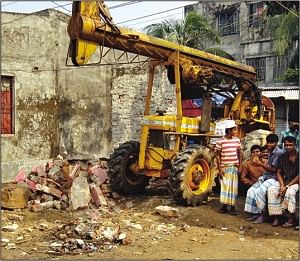Madartek residents no longer to spend sleepless nights

Wasa taking preparation to set up a pump at the Madartek Bazar.Photo: STAR
At last Dhaka Water and Sewerage Authority (Wasa) is installing a deep well pump at Madartek Bazar to cope with water crisis in the area in the upcoming dry season.
Acute water shortage, especially during the dry season that usually runs from March through June, have been causing immense sufferings to around 5,000 residents for years.
"We had to collect water from the nearby Wasa pump house. We even spent sleepless nights to collect water from the supply line, as we used to get a little water in the line late at night only," said FM Nazmul Haque, a resident of Madartek, describing the sufferings of locals during the last dry season.
Engineer M Raihanul Abedin, managing director (MD) of Dhaka Wasa, said, "It's not a problem in that particular area only. Dhaka Wasa has a water supply shortage of about 35 crore litres against the daily demand. The shortage gets worse during the dry season, as aquifer water layer falls in the dry season. Adding to that, people use more water in a hot day [during dry seasons]."
"To tackle the next dry season, we are taking both short-term and long-term precautionary measures," he said.
As part of the short-term measure, Wasa will be replacing 20 worn-out deep well pumps and replace those with new ones. Besides, 10 more deep well pumps will be installed in crisis areas that need urgent attention. The Wasa also has plans to install 50 km of new supply lines and replace 30 km of old lines.
As opposed to the demand of about 200 crore litres of water in Dhaka city, 472 pumps and three water treatment plants of Wasa are currently capable of pumping a maximum of 180 crore litres of water. "But, due to the low voltage and load-shedding of electricity, we can't deliver our maximum capacity," said Abedin.
"To solve the low voltage problem, we are installing AVRs [automatic voltage regulator], which would adjust voltage fluctuations at the pump houses. We will be able to implement this plan by next March," he added.
Furthermore, Sayedabad Water Treatment Plant is now running with its full production capacity following the installation of a high capacity gas-run generator at the site, said the Wasa MD, adding, "A few months back, low voltage problem caused the daily production of the plant to come down to 16.5 crore litres from its maximum capacity of 22.5 crore litres. We used to get less than 380 volt, whereas 420 volt electricity is needed for the plant."
To reduce Wasa's dependency on Desa (Dhaka Electricity Supply Authority), diesel-run generators at Wasa pumps are being converted to gas-run ones, said Abedin.
Dhaka Wasa authorities claimed that the water crisis in the city would be solved within a few years. To achieve the target, second phase of the Sayedabad Water Treatment Plant has begun and the plant will be running with its extended capacity by 2010.
Fifty crore more litres of water would be added daily for Dhaka residents if a project to install around 70 new pumps at Shingair in Manikganj is implemented, said SM. Mahfuzur Rahman, public information officer of Dhaka Wasa.
"I've recently visited our ongoing project at Shingair, Manikganj. Our study says that the underground water in the area is arsenic-free. We are planning to set 70 pumps over there, which will supply around 50 crore litres of water daily. We can supply the water in the Mirpur area by laying 13 to 14 pipelines. We are now studying feasibility of the project that will take a couple of years to be implemented."
"Funded by the Asian Development Bank (ADB) and the World Bank, we are preparing a master plan for water supply in Dhaka for the next few decades," Rahman said.
Under the plan, setting up of new water treatment plants are being considered as the Wasa relies too heavily on deep well pumps that will cause the aquifer water level in the city to descend further, At present, deep well pumps provide 84% of Wasa's water production.
Danish International Development Agency (Danida) is funding the third phase of the Sayedabad Water Treatment Plant to increase its production capacity to 45 crore litres a day. Moreover, the ADB is providing assistance to set up another water treatment plant at Khilkhet. The river Meghna would be the source of water for the plant. Feasibility of the project is now being studied, Rahman added.

 For all latest news, follow The Daily Star's Google News channel.
For all latest news, follow The Daily Star's Google News channel. 




Comments